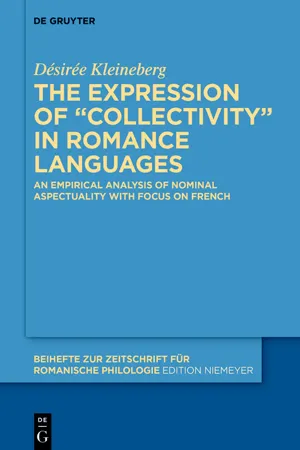
The expression of "collectivity" in Romance languages
An empirical analysis of nominal aspectuality with focus on French
- 334 pages
- English
- ePUB (mobile friendly)
- Available on iOS & Android
The expression of "collectivity" in Romance languages
An empirical analysis of nominal aspectuality with focus on French
About this book
While previous research on collective nouns in Romance languages mostly adopts a semasiological and theoretical perspective focusing mainly on one single language, the present study takes an onomasiological and comparative approach which is strongly based on empirical evidence.
Against this background and in analogy to the verbal domain, the work elaborates further the functional category of nominal aspectuality which describes the construal of extra-linguistic entities as well as the linguistic means reflecting it. In this sense, collective nouns are systematically compared with other (nominal) means of expression of collectivity in French, Spanish, Italian and Portuguese, focusing especially on object mass nouns, which have hardly been studied so far for Romance languages. On the basis of corpus analyses and acceptability judgement studies, a holistic picture is thus drawn of the semantic-syntactic and derivational properties of various noun types in the synchrony of present-day language as well as of the diachronic lexicalisation paths of these very nouns.
The work thus contributes to the understanding of the verbalisation of pluralities by linking and complementing previous monodimensional approaches and, above all, by placing them on a broad empirical basis.
Frequently asked questions
- Essential is ideal for learners and professionals who enjoy exploring a wide range of subjects. Access the Essential Library with 800,000+ trusted titles and best-sellers across business, personal growth, and the humanities. Includes unlimited reading time and Standard Read Aloud voice.
- Complete: Perfect for advanced learners and researchers needing full, unrestricted access. Unlock 1.4M+ books across hundreds of subjects, including academic and specialized titles. The Complete Plan also includes advanced features like Premium Read Aloud and Research Assistant.
Please note we cannot support devices running on iOS 13 and Android 7 or earlier. Learn more about using the app.
Information
Table of contents
- Title Page
- Copyright
- Contents
- List of abbreviations
- Introduction
- I Theoretical foundations
- II The synchronic characteristics of collection nouns in present-day language
- III The diachronic development of French collection nouns
- IV General conclusion and outlook
- Subject index